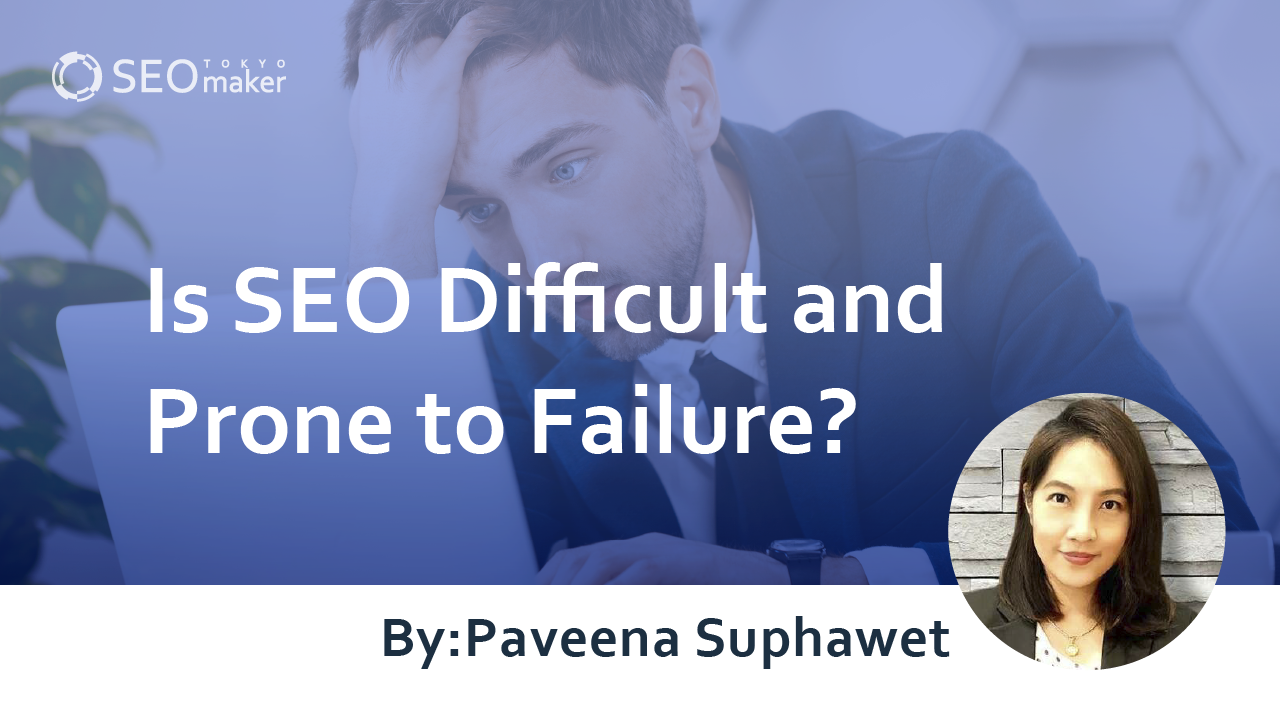Is SEO Difficult and Prone to Failure? [Insights from Experience]
contents
Can SEO be challenging and prone to failure? : Insights from Experience
While SEO can be complex, many agree that Google’s core updates are challenging. However, it’s not always just the core updates that are troublesome.
In fact, core updates often result from the pursuit of user-centricity, so they’re not necessarily negative outcomes.
On the other hand, some SEO professionals also face obstacles within their companies. While some may question this assertion, it’s a real scenario in the SEO field. This article delves into the issue of bosses who hinder SEO efforts, with real-life anecdotes.
Google Isn’t the Enemy of SEO
First and foremost, let’s dispel a misconception: Google isn’t the enemy of SEO. While experiencing a significant drop in rankings and sales due to Google’s core updates can be detrimental, consistently maintaining top rankings without considering users is unsustainable.
Since Google prioritizes users and updates accordingly, if you operate your site with a user-first approach, the impact shouldn’t be as severe.
While a ranking drop may sound negative, it could simply indicate heightened competition rather than a fundamental change in your site’s evaluation.
The Ultimate Goal is User-First
Ultimately, SEO revolves around how well you prioritize the user experience. The ultimate goal hasn’t changed over time, despite evolving algorithm criteria. Therefore, considering Google as an adversary is misguided.
The Real Enemies of SEO Companies and Bosses!?
So, who or what are the true enemies of SEO? While labeling them as adversaries may be questionable, obstacles often arise within companies.
To be precise, it’s not the company itself, but sometimes, bosses pose barriers to implementing SEO strategies. Individuals tasked with SEO or web management roles may find, surprisingly, that their superiors obstruct their work, as observed from various online discussions.
Why Do Bosses Interfere with SEO?
The trouble lies in bosses’ lack of awareness that they’re hindering SEO efforts. Several reasons contribute to this situation.
-Some believe anyone can do SEO
-Not fully understanding its tactics
-Limiting themselves to what they know about SEO
SEO isn’t something everyone can handle. Those who believe otherwise typically possess shallow knowledge of SEO. Such bosses fail to grasp their subordinates’ expertise in their respective fields.
When SEO proposals are presented and their effectiveness explained, bosses without SEO knowledge often struggle to comprehend and implement them.
Some bosses stick to what they know about SEO, limiting their approach to familiar tactics. As a result, they may resist adopting new strategies.
Examples of Uninformed Bosses in SEO
Here are four instances where bosses acted as obstacles, based on my personal experience
Case 1: Overemphasizing Meta Tags
Meta refers to the title, meta description, and meta keywords. The title and meta description are crucial for SEO, understandably prioritized. Titles can directly impact SEO, and meta descriptions affect click-through rates.
The issue arises with meta keywords. Common knowledge among SEO professionals is that Google does not evaluate meta keywords. While information including them is harmless, they should not be a focal point for active efforts.
However, there are claims that not optimizing the site’s meta keywords can hinder ranking. While the effect of meta keywords on ranking is not entirely dismissed, considering the time and effort needed to scrutinize and address them on a site with hundreds of pages, the preference on the ground would likely be to focus on other tasks.
[Side Note] It’s commonly understood that meta keywords and SEO meta keywords don’t influence search rankings. Yet, some still assert they do. Experiments suggest that, exceptionally, meta keywords might impact rankings,
Especially with keywords that have very low search volume or don’t appear in searches at all.
This effect might occur when there are few alternatives for search results, suggesting the use of meta keywords as a last resort. However, determining which keywords will have this effect is challenging, and the value of the content in such cases is questionable, typically making it advisable to avoid relying on this strategy.
Case 2: Obsession with Page Quantity
While it’s said that the number of pages is not crucial for SEO, having more related pages allows for extensive internal linking, which does impact SEO.
However, increasing pages blindly is not beneficial. When adding pages, avoiding keyword duplication and ensuring content quality are essential.
However, a boss who believes having more pages makes the site stronger might resort to the following tactics.
-Showing only the beginning of content with a “read more” link to a separate URL
-Listing all article updates in a news section, each creating two pages per content.
If these actions serve a purpose in guiding users, they are welcome. Yet, if done solely to increase page count, they are pointless.
Case 3: Relying Solely on Content
Creating content is indeed crucial for SEO, but SEO doesn’t revolve solely around content.
While some assert that success in SEO is guaranteed by consistently producing content, this is not incorrect.. Essential prerequisites include ensuring fast loading speeds, addressing technical aspects, optimizing server settings, establishing user pathways, incorporating internal links, and ensuring mobile responsiveness.
Neglecting these aspects while solely focusing on content expansion can often lead to stagnant rankings.
While it’s commendable to prioritize content creation, merely uploading it without proper internal linking can result in an increase in isolated pages, necessitating improvements.
[Side Note] Free Blogs vs. WordPress
Free blogging platforms like Ameba Blog and Hatena Blog come with pre-configured site settings. While customization is possible, rankings and SEO can be achieved simply by consistently producing content. This is a significant advantage of free blogging platforms.
WordPress, on the other hand, requires some initial setup, but it’s structured systematically. Even with a basic theme and regular postings, rankings often improve. This is because WordPress provides essential site settings from the outset.
Creating a site from scratch requires various configurations, making it challenging to improve rankings with content alone.
Case 4: Ignoring Assigned Responsibilities and Consulting SEO Companies
One of the worst scenarios I’ve experienced is when an SEO company intervenes without involving the assigned personnel.
Sometimes, bosses seek advice directly from SEO companies without consulting their assigned personnel. While seeking input from SEO experts isn’t inherently problematic and can provide valuable insights and alternative perspectives, disregarding assigned personnel’s expertise in favor of solely relying on SEO companies’ advice can lead to issues.
If bosses automatically assume the correctness of SEO company suggestions without discussing them with their team or providing specific improvement strategies, it indicates a problematic approach.
Likely, they’re seeking validation from SEO companies without engaging in meaningful discussions or considering their team’s input.
Bosses and the Dunning-Kruger Effect
Going off on a tangent, are you familiar with the Dunning-Kruger effect?
Even those unfamiliar with the language might have seen graphs like the one above. Simply put, less experienced individuals often overestimate their abilities, gaining confidence from minimal experience and believing they are competent. However, as they gain more experience, they realize how much they don’t know, leading to doubts about their capabilities, until further learning finally brings genuine competence.
In SEO, truly skilled individuals rarely claim they can do it, indicating the difficulty of the field. Many think of themselves as still learning, far from being experts.
The issue arises when a boss with little SEO experience believes they are proficient, often leading to challenging interactions with subordinates who see them as novices. Despite their belief in their own abilities, their lack of knowledge makes meaningful conversation and persuasion difficult.
The saying “The heavier the ear of rice, the deeper it bows” reflects the ideal humility and acknowledgment of one’s growth and learning path.
So, what should be done?
Well, when your boss thinks they know about SEO but actually doesn’t, it becomes a challenge to address the situation. It’s easy to gossip behind their back, but that won’t solve anything. Taking the issue to higher management might be an option, but it could also create tension.
I’ve thought of two approaches…
-Present a concrete plan with numbers.
-Bring in an SEO company.
Bosses often respond positively when presented with a clear plan backed by numbers, as it gives them a tangible vision of the future. While setting numerical targets can be daunting, it’s often necessary to move the conversation forward rationally.
Another option is to involve an SEO company or a third party. Interestingly, individuals who were previously dismissive may suddenly become receptive when an external authority figure presents the same ideas. It’s somewhat about credibility, but having someone else echo your viewpoint can implicitly suggest that it’s not just your opinion, which can lead to a change in perspective.
Summary
I’ve shared some challenging SEO scenarios based on my experience. Ultimately, whether or not your boss understands SEO, it all comes down to individual initiative. Sometimes, the company might not allocate a budget for SEO, so it’s essential to take a broader perspective on things. That’s the gist of my experiences.











![What is a Description? Explaining the Meaning, Writing Style, and Changing Word Count – [2023 Edition]](https://www.switchitmaker2.com/en/wp-content/uploads/2024/09/what-is-description.webp)










